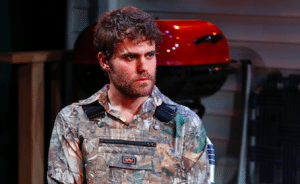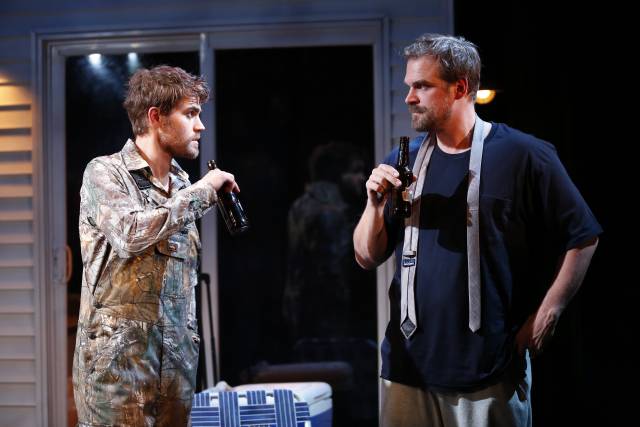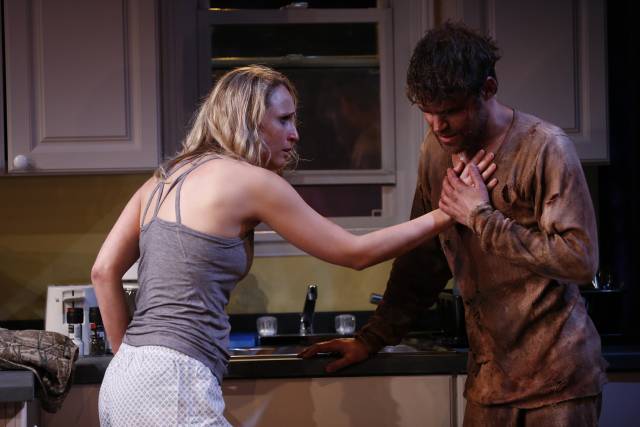

Paul Wesley may be famous for facing supernatural beings in The CW’s The Vampire Diaries, but in William Francis Hoffman’s Cal in Camo, he is battling something much more horrific: his character, Flynt, is trying to get over the death of his wife by spending some time with his sister Cal (Katya Campbell) and her husband Tim (David Harbour), who are going through a crisis of their own. Every character in the play is lost, they’re all trying to rediscover themselves as they’ve become nothing but facades. The small ensemble is rather commendable, but it’s Wesley who is a true revelation. Where he could’ve easily made Flynt all about the surface and given him tics and mannerisms to reflect his inner turmoil, he instead focuses on revealing the character through Flynt’s silences. Cal in Camo is Mr. Wesley’s New York stage debut, but judging from his command of the stage, it’s quite likely he’ll be back many more times.
I had the opportunity to speak to him about entering Flynt’s mind, his interest in directing, and some of his most cherished memories related to theatre.
You grew up in New Jersey, was theatre a big part of your life? Do you remember the first time you saw something on stage for instance?
Yeah actually. I was kinda lucky, I’m not sure if this is a prerequisite, but we had this thing in elementary school where everyone had to partake in performances. We had a performance every year and every single kid in our school had to perform. So I’d been doing school theatre since I was in first grade. We took theatre trips and I know I saw Les Mis and The Lion King. One of those two was my first theatre experience in New York, I remember we took the school bus there. This might’ve been when I was in high school, but I also remember waiting outside for Lou Diamond Phillips to give me his autograph. I was doing a show with him years later and it was a surreal experience after having waited to get his autograph.
Flynt in Cal in Camo is so mysterious, what kind of preparation did you go through in order to understand him? Did you come up with your own backstory or did you work with the playwright?
The play is ambiguous in itself, it’s very symbolic and there’s a lot of mystery, so I asked a lot of questions because much of it is very open ended. What was interesting about working with Bill was that he didn’t give me a backstory, he wanted the play to be personal to me. I’ve never suffered a tragedy as immense as what Flynt goes through, so I needed to make it personal, I created an imaginary world and understood that in a logical way. I thought about loss I’ve had in my life and I tried to experience that. Acting is a funny thing in that something that can seem very trivial to others can be very profound to you. If you can bring that on stage, then you’re doing your job.

Like his name indicates, once things get in touch with Flynt they ignite. However he’s pretty steady, it’s others that catch fire when they’re around him so to speak. Was it important for you to ground the character this way? Did you try different approaches?
It’s interesting, I had only done one other professional play before, in Los Angeles, and I didn’t really understand the rehearsal process. The thing about Flynt is that ultimately the story is about a broken marriage with two people who are searching for something. Flynt shows up to their home and he is searching for something himself, so inadvertently he’s the thing that brings that couple together. He saves himself and them. I think the story is about Cal, it’s her dealing with postpartum depression, not knowing how to be a mother and a wife, but Flynt is the character that comes in and glues everything together. I really wanted things to happen to Flynt organically, even without his knowledge of them happening. I wanted him to discover a profound meaning in things unbeknownst to him. The only way I could find that in the rehearsal process was to give him an innocence, a sweetness, a soul, something almost childlike. I wanted him to discover things with the audience.
You directed the episode “Woke Up with a Monster” in The Vampire Diaries, and pointed out that it was easier to direct because it took place indoors. Does this mean you see yourself directing theatre in the future, since you have less elements to battle?
I was just thinking about this right before you called me actually. I was thinking about theatre in general, and the differences between TV and theatre and film. The advantage/disadvantage of theatre is that once the play starts you can’t stop it. I don’t care if you’re not doing it right, or if you don’t feel in the moment...you need to figure it out because you don’t really have a choice. The difference is that onstage you have a month or two, or however long the run is, to really find the character. In TV and film you have one shot, you have that day and that’s it, if you don’t get it you wasted a lot of people’s money and there’s no going back.
As far as directing I definitely think that film is a director’s medium, TV is a writer’s medium and theatre is an actors’ medium. I think that a theatre director is really there to come up with the aesthetic and tone, but as far as lending a hand to the actors they should allow the actor to feel free and confident, so they can go explore and find something spontaneous and real. So when the audience shows up they feel like they’re watching something that’s honest. I would love to explore the notion of directing, but I think I would need to be a little more involved in theatre before I stepped into those shoes.

You’ve played the same character in The Vampire Diaries for almost eight years and each season you discover new things about him. I wonder how is it to play Flynt, who in a way is trapped in the same loop, every night?
There’s a lot less exposition in theatre. We have one play, that play is written and if it’s good a lot of the fat of the play is gone and the meat is there. In TV when you have 22 episodes there’s a lot of exposition and filling holes, B story, C story etc. Quite frankly there are a lot of episodes that aren’t great, and you don’t have that in theatre if the play is great. I don’t envy the idea of being a TV writer and coming up with 22 episodes every year. I think doing eight episodes a year like cable, is possible. What I’m trying to say is that sometimes I forget who Stefan is in The Vampire Diaries, because I get sort of lost in the world of TV, where for example I don’t know why he’s saying what he’s saying, but that’s only because it serves another story. We also have less time to analyze it. In theatre you work on the same script for months and that’s a gift, you can discover something new every day.
You’ve listed Scenes from a Marriage as your favorite film and I wondered if you saw the Ivo Van Hove version. Also, which of Bergman’s scripts would you want to see or maybe turn into a stage version?
I didn’t see that! I’ve seen Ivo Van Hove’s A View from the Bridge and The Crucible, he’s done such interesting work, to be honest I didn’t even know he made that. As far as stage versions, my other favorite Bergman is probably Persona, that movie is fantastic. Scenes from a Marriage is so raw and realistic, feels like you’re watching two people, and then Persona, or any of his other movies like The Seventh Seal, are more esoteric and you don’t quite know if you’re watching fantasy or reality. There’s so much symbolism and interpretation, it’s much more abstract and David Lynch-ian in its energy. What struck me from Scenes was its realism, John Cassavetes is someone else who could capture this honesty and truth, like he did in A Woman Under the Influence. I have a keen eye, if something doesn’t seem true it ruins the experience for me, and these guys really did special things, they tricked me, they fooled me and took me places. In theatre we know we’re watching actors and you can’t always fool everyone for two hours, but if you can get a few moments in there and evoke a feeling of honesty for even a few beats, that’s a special experience.
Stephen Sondheim turned a Bergman movie into a musical, and this is a corny segue, but I wonder if you know how to sing, and if you wanna do any Sondheim pieces?
(Laughs) First of all I don’t, I used to sing. My mother would say I sing though. Look, if we’re being really honest I don’t know much about musicals. I like West Side Story and I’ve seen a handful but it’s definitely a different beast for me, I don’t know if I understand them in the way others do. I was thinking actually, we have a really long monologue in our play and in musicals the actors have to find this kind of motivation to suddenly burst into song. They’ll be doing a scene and suddenly you burst into song, and you have to make this not look silly, find the true motivation and visceral truth behind wanting to burst into song. I was thinking about that with our monologues, I was talking to David Harbour about it, we need to find the emotional catalyst for performing these long monologues in the same way that an actor in a musical finds the emotional catalyst for bursting into song. So I’ve been thinking about musicals lately, but I’m not that well versed in them.
For tickets to Cal in Camo click here.